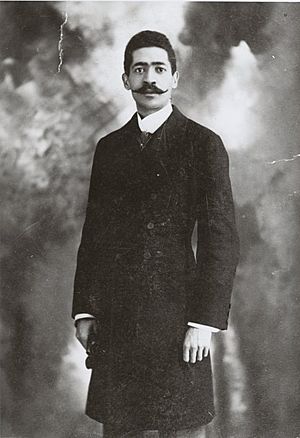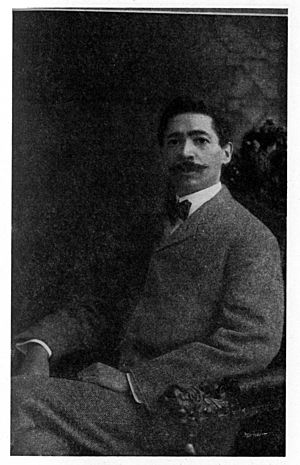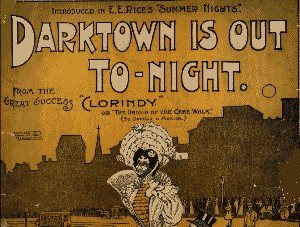Will Marion Cook facts for kids
Quick facts for kids
Will Marion Cook
|
|
|---|---|
 |
|
| Background information | |
| Birth name | William Mercer Cook |
| Born | January 27, 1869 Washington, D.C., U.S. |
| Died | July 19, 1944 (aged 75) New York City |
William Mercer Cook (born January 27, 1869 – died July 19, 1944), known as Will Marion Cook, was an American composer, violinist, and music director. He was a student of the famous composer Antonín Dvořák.
In 1919, Cook took his New York Syncopated Orchestra to England. They even performed for King George V. Cook is best known for his popular songs and groundbreaking Broadway musicals. These shows featured African-American creators, producers, and actors. Two famous ones are Clorindy, or The Origin of the Cake Walk (1898) and In Dahomey (1903). In Dahomey toured for four years in the United Kingdom and the United States. Cook also worked as the music director for the George Walker-Bert Williams Company.
Contents
Early Life and Musical Beginnings
Will Marion Cook was born in 1869 in Washington, D.C. His parents, John Hartwell Cook and Isabel, were free people of color before the Civil War. They believed strongly in education. His father was one of the first Black lawyers in Washington.
After his father died in 1879, Will's mother faced challenges. Will, at age 10, was sent to live with his grandparents in Chattanooga, Tennessee. His grandparents had bought their freedom from slavery. There, he heard what he called "real Negro melodies" and folk music. He later called this his "soul period."
After a year, his grandfather sent Will back to his mother. Will decided to focus seriously on music. At age 14, he began studying violin at Oberlin Conservatory in Ohio. Cook's musical talent was clear from a young age. With help from the African-American community, he held special concerts to help pay for his studies abroad.
From 1887 to 1889, Cook studied in Berlin, Germany. He worked with the violinist Heinrich Jacobson. Jacobson was a student of the famous Hungarian violinist Joseph Joachim.
Family Life
In 1898, Cook married the young singer Abbie Mitchell. They had a daughter, Marion Abigail Cook, in 1900. Their son, Will Mercer Cook (known as Mercer), was born in 1903. Their daughter was raised by family members. Will Mercer Cook became a history professor at Howard University. He later served as a United States Ambassador to Niger and Senegal.
Studying with a Master
From 1894 to 1895, Cook studied with the Czech composer Antonín Dvořák. Dvořák was working in the United States at the time. Cook also studied at the National Conservatory of Music of America.
Cook had performed professionally as a student. He made his first public performance in 1889 in Washington, D.C.. However, it became harder for Black performers in classical music. So, Cook found his place in musical theater instead.
Composing and Touring
In 1890, Cook became the director of a small orchestra. They toured the East Coast. He planned a performance for the Chicago World's Fair in 1893, but it was canceled.
In 1898, his musical comedy Clorindy: The Origin of the Cakewalk was performed. He created it with the poet Paul Laurence Dunbar. This was the first all-Black show to play at a well-known Broadway venue. It was staged on the Roof Garden of the Casino Theatre.
After this, Cook became the main composer and music director for the George Walker-Bert Williams Company. This was an African-American entertainment company.
Cook kept composing and created many successful musicals. The most important was In Dahomey: (1903). This show was developed with Williams & Walker, who also starred in it. Theatre expert Gerald Bordman calls this "the first full-length musical written and played by blacks to be performed at a major Broadway house." The musical also featured the top vaudeville performers of the time. It made fun of parts of African-American and U.S. history. The characters were much more than simple stereotypes. After its opening, the musical toured the United Kingdom. It came back to New York in 1904 and then toured the United States.
Cook was best known for his songs. He used folk music in a new and special way. Many of his songs were first heard in his musicals. They were written for groups or solo singers. Some were published in A Collection of Negro Songs (1912). Later in his career, Cook also conducted choirs and orchestras. He put on several concerts.
He also started many singing groups in New York City and Washington, D.C. He founded the New York Syncopated Orchestra. This group toured the United States in 1918. In 1919, they went to England to perform for King George V. This orchestra, also known as the Southern Syncopated Orchestra, helped bring jazz and ragtime music to other countries. They toured England and Europe. Famous musicians like jazz clarinetist Sidney Bechet and Cook's wife, Abbie Mitchell, were part of his company. Cook also helped younger musicians like Eubie Blake and Duke Ellington, who became very famous.
One of his last shows was Swing Along (1929).
In 1944, Cook was diagnosed with cancer. He died on July 19, 1944, in New York City. Cook is buried in Woodlawn Cemetery in Washington, D.C.
Legacy and Recognition
- The Will Marion Cook House in Harlem, New York, is a National Historic Landmark.
- His family home in Washington, D.C., is now part of Howard University. The site is marked on Washington, D.C.'s African-American Heritage Trail.
Notable Works
- Clorindy: The Origin of the Cakewalk (1898)
- The Policy Players (1900)
- In Dahomey: A Negro Musical Comedy (1903)
- The Southerners (1904)
- Bandanna Land (1907)
- Swing Along (1929)
- Rain Song: Exhortation—A Negro Sermon (1912)
Images for kids
See also
 In Spanish: Will Marion Cook para niños
In Spanish: Will Marion Cook para niños
- African-American music
- African American musical theater
- Will Marion Cook House
 | John T. Biggers |
 | Thomas Blackshear |
 | Mark Bradford |
 | Beverly Buchanan |




